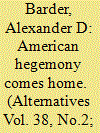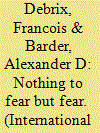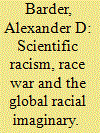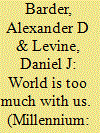|
|
|
Sort Order |
|
|
|
Items / Page
|
|
|
|
|
|
|
| Srl | Item |
| 1 |
ID:
121197


|
|
|
|
|
| Publication |
2013.
|
| Summary/Abstract |
International theorists have long argued over the longevity of American hegemony and whether or not the American-centered international order is currently in crisis. What remains largely missing in many of the analyses of the history and present of American hegemony is an examination of how maintaining global hegemony affects or has affected domestic American political and economic institutions. Looking back at the early 1970s, I examine the nexus between the crisis of American global hegemony in the aftermath of the Vietnam War, the project of neoliberalization in Chile and how the Chilean socioeconomic "laboratory" set an important precedent for the subsequent adoption of neoliberal reforms in the United States under the Reagan Administration. The reassertion of American hegemony was coextensive with a neoliberal project that was initially experimented with in Chile under the authoritarian rule of Augusto Pinochet.
|
|
|
|
|
|
|
|
|
|
|
|
|
|
|
|
| 2 |
ID:
092297


|
|
|
|
|
| Publication |
2009.
|
| Summary/Abstract |
Moving beyond the political framework of both Hobbes and Schmitt that privileges a centralization of power as a way of dealing with the fear of violent death, this article turns to Foucault's discourses of war, power over life, and governmentality to illuminate the contemporary reproductive potential of fear in exercises of preservation of life in society. The decentralization of fear and power in governmentalized modernity encourages various public agents/agencies to mobilize the specter of danger, threat, insecurity, or enmity to normalize populations. This article reflects on the effects of this (re)productive mobilization of fear and emphasizes the proliferation of dispositifs of terror that engender a fear of not being able to live one's normal life.
|
|
|
|
|
|
|
|
|
|
|
|
|
|
|
|
| 3 |
ID:
165059


|
|
|
|
|
| Summary/Abstract |
The premise of this paper is the elucidation of a different ontology of global politics and order of the nineteenth century. International relations theory takes for granted a largely ahistorical state-centric ontology, which reifies a specific Eurocentric state and state-system as the embodiment of global politics. Instead, I focus on an alternative ontology of race, racial hierarchy and racial difference as significant for defining the content of an imperial global politics and order. My paper places into context the emergence of scientific racism and social Darwinism as key intellectual elements in defining a political imaginary that influenced the politics of difference and violence. What I show is that this intellectual history reveals a global order that was fundamentally racialised and that global violence was understood and practiced as race wars.
|
|
|
|
|
|
|
|
|
|
|
|
|
|
|
|
| 4 |
ID:
113854


|
|
|
|
|
| Publication |
2012.
|
| Summary/Abstract |
International Relations' constructivist turn - that body of approaches emerging in the late 1980s/early 1990s in which international outcomes were held to be predicated upon complex social arrangements, rules, norms, institutions, language and culture - emerged from a unique historical and intellectual moment. Initially, this theoretical turn was deeply committed to reflexivity and circumspection: since events were held to be contingent and theorists were bound up in them, the obligation to sustained critical self-reflection was central to the project. That commitment would not last, however. By the mid-1990s, it had given way to a 'middle ground' (or via media) position, which aligned itself with dominant materialist and rationalist methodologies and epistemologies. We wish to examine that moment of realignment: how it happened, and what it might mean. We argue that having imbibed a degree of the free-floating optimism that was 'in the air' in the 1990s, via media constructivism's leading scholars came to believe that it was no longer necessary to problematise the historicity and contingency of their own historical moment and philosophical horizons. The post-Cold War 'world', we hold - or, at any rate, one account of it - was 'too much with' via media constructivism: selectively constraining its reflexive impulses and critical tools in ways that, however unintentionally, provided cover for particular normative and ideological configurations. To move past this, we argue that via media constructivists need a sustainably critical ethos: one which 'repoliticises' international theory by unmasking its hidden ideological and political starting points.
|
|
|
|
|
|
|
|
|
|
|
|
|
|
|
|
|
|
|
|
|